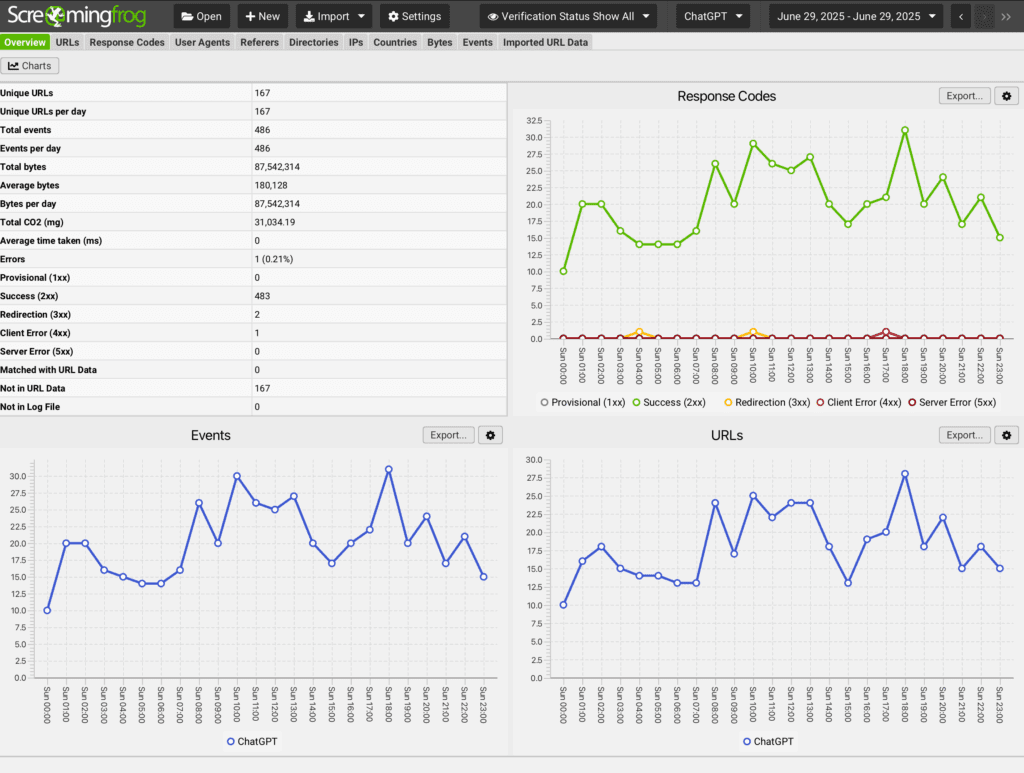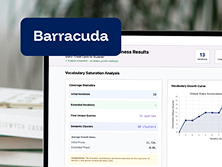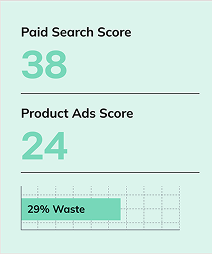Home / Blog / How To See When ChatGPT Is Quoting Your Content By Analyzing Log Files
How To See When ChatGPT Is Quoting Your Content By Analyzing Log Files

Published: June 30, 2025
Share on LinkedIn Share on Twitter Share on Facebook Click to print Click to copy url

Contents Overview
The way people find and consume information is shifting fast, and it’s not just about Google or Bing anymore. Increasingly, buyers are turning to conversational AI tools like ChatGPT to get answers and advice. But here’s the challenge: when someone talks to ChatGPT and your content or brand becomes part of that conversation, traditional analytics like GA4 won’t tell you how often that’s happening because it’s not on your site. But, there is a solution to tracking how often this happens.
If you’re serious about understanding your true visibility and reach in ChatGPT conversations based on your optimization efforts, it’s time to dig into a resource that marketers often ignore, your server log files.
Why Analytics Misses The Real Story With ChatGPT
It’s easy to fall into the trap of measuring everything by what shows up in Google Analytics or your other JavaScript-based analytics platforms. The reality is, when ChatGPT uses your content to answer user questions, those sessions are usually invisible in your standard reports since ChatGPT does not fully register a JavaScript based session.
This analytics gap has become a huge blind spot for SEOs and marketing departments. As more discovery happens within AI tools like ChatGPT and Gemini, you need a way to see when your site is being sourced in those conversations.
Enter Log File Analysis For ChatGPT Visits
Your server’s access logs are a direct record of every request that hits your site, regardless of how it got there. This includes visits from human users, bots, crawlers, and—importantly—requests made by ChatGPT on behalf of real people.
If you want to know:
- How often is ChatGPT using my content to answer user questions?
- Which topics and pages are being referenced?
- Am I actually part of the AI-driven discovery journey?
Log files are the answer to understanding how often ChatGPT is including you in conversations with users.
What To Look For: The ChatGPT-User Agent
The key is in the user-agent string. When someone asks ChatGPT or a Custom GPT a question, and the AI pulls info from your site, it visits as “ChatGPT-User.” This is not a crawler for training data, and it’s not a bot scraping the web, it’s a real user, via ChatGPT, asking a question that brings your content into the conversation.
You’ll see requests like this in your logs:
Mozilla/5.0 AppleWebKit/537.36 (KHTML, like Gecko); compatible; ChatGPT-User/1.0; +https://openai.com/bot
What We Found In Our Logs
We recently analyzed just a single day of log files for one of our properties. Here’s what we discovered:
- 490 requests from ChatGPT-User
- 167 unique pages accessed
- Only 3 sessions reported by GA4 for the same period
That’s a staggering difference. Standard analytics would have us believe there was barely any traffic from ChatGPT at all. The log files told the real story: our content was being referenced in hundreds of actual conversations with users.

Even more interesting, by reviewing the specific URLs, we could see exactly which pages and topics ChatGPT was relying on to answer questions. This gives you actionable data on what content is being cited, what questions your pages are helping answer, and where you might want to invest more effort.
Why This Matters: LLM Traffic Converts
We’re seeing conversion rates from ChatGPT-referred visits that are 8x higher than average. Ahrefs recently reported a 23x boost for their own ChatGPT visitors. This isn’t a fluke. When users arrive on your site from an AI answer, they’re typically deep in the decision-making process and ready for a direct conversation or to make a purchase.
If your content is being referenced by LLMs, you’re already part of the modern buyer’s journey, even if you can’t see it in your typical dashboards.
Rethinking SEO Metrics: Introducing the Conversation to Conversion Metric
With all these changes, it’s clear we need to rethink how we measure SEO performance. Rankings and organic sessions are only part of the story. Increasingly, value comes from your content being recommended in conversations powered by LLMs. That journey can start and end without a single Google search or standard pageview.
That’s why we’re measuring the Conversation to Conversion metric. Here’s what it means:
- Conversation: Any user-initiated engagement that includes your content in an LLM or AI assistant’s answer, as evidenced by a ChatGPT-User visit in your logs.
- Conversion: The resulting measurable action whether that’s a form fill, a phone call, or a purchase that follows after a user is referred to your site by an LLM interaction.
By tracking the path from LLM conversation to on-site conversion, you get a more accurate read on how your content is influencing real decisions, even when those decisions begin somewhere other than search.
How to measure it:
- Identify all ChatGPT-User visits in your log files.
- Track which sessions lead to actual conversions or events through analytics, form submission questions, and conversations with your leads. Ask them, did you use ChatGPT or another LLM while deciding on if you should reach out to us?
- Analyze conversion rates and topics most frequently driving value.
This metric is a more honest way to measure your true digital presence in an AI-powered world. It shifts focus from just being visible on a SERP, to being part of the real conversations that drive business outcomes.
How To Get Started
- Pull your raw server access logs.
- Run them through a tool like Screaming Frog Log File Analyzer.
- Filter for requests with the ChatGPT-User agent.
- Analyze which URLs are being accessed, when, and how often.
- Map those visits to conversions using your usual tracking or CRM tools.
This is the fastest way to reveal how much your content is being used in real user conversations within ChatGPT and other AI tools—and how often those conversations are turning into real results.
Final Thoughts
AI-driven discovery is already happening. If you want to understand your true presence in these channels, don’t just rely on GA4 or your regular analytics. Go straight to your log files. That’s where you’ll see the real picture: how often you’re showing up in AI-powered conversations, and what information is actually driving those interactions.
If you want help with log file analysis or optimizing for generative engines like ChatGPT and Google’s AI Overviews, reach out. This is one area where a little technical insight can go a long way in shaping your SEO and content strategy for the future.

About Dan Hinckley
MORE TO EXPLORE
Related Insights
More advice and inspiration from our blog
Why Traditional SEO KPIs Are Declining in 2026
Traditional SEO metrics are losing relevance in 2026 as AI answers...
Tony Salerno| February 10, 2026
What Brands Miss When They Treat GEO Like SEO
Treating GEO as a replacement for SEO breaks generative visibility. Learn...
Matt Parker| January 21, 2026
How Home Goods Buyers Decide in 2026 Across Social, Search, AI, and Your Website
How home goods buyers discover, evaluate, and decide in 2026 across...
Kimberly Anderson-Mutch| December 19, 2025





